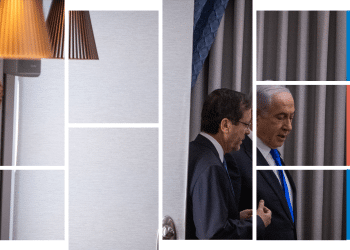Exactly two weeks before Europe and the rest of the world are set to mark 75 years since the Normandy landings, which set the stage for the allies' victories over Nazi Germany in World War II, citizens of the EU's 27 member-states will embark on a different campaign over the future of the old continent on Thursday.
The European Parliament elections could have a major impact on the face of the EU in coming years, given the strengthening of radical populist, nationalist parties on both the right and left of the political spectrum, a majority of whom loathe the organization and its bureaucratic and wasteful conduct.
The composition of the European Parliament, which has its headquarters in Brussels and Strasbourg, is determined once every five years in elections that up until recently have been considered either boring or bizarre. As with the Eurovision song contest, the old parties would enlist celebrities and colorful and provocative figures alongside inexperienced politicians, in the hope of garnering voters' attention. But the more Europe grew and became established, and the more the authority of the European Parliament expanded, the less European voters were interested in the continental body.
The old order begins to crack
In the first elections for European Parliament in 1979, when the organization counted nine countries as members, some 62% of those eligible to vote took part in the election. In the most recent elections in 2014, with the organization comprising 28 countries, only 42% of eligible voters showed up to the ballot box. Voter turnout in some of the newer EU member countries in Central and Eastern Europe was even lower, and in some cases, the lowest ever recorded for an EU country. In Slovakia, just 13% of eligible voters took part in the election. In the Czech Republic, voter turnout was 18% and in both Poland and Romania, it was 23%. In Portugal, the Netherlands and Britain – just two years before the Brexit referendum – voter turnout stood at under 40%. Despite the fact that the European Parliament is the only democratic tool that allows EU citizens to have some form of a direct say on what goes on in Brussels, it is still seen as a rubber stamp for the despotic and exorbitant bureaucratic mechanism that dictates to Europeans from Cyprus to Finland how to live, without regard for the day-to-day challenges those countries face.
The current election campaign appears to be different from its predecessors. The events of the last five years have shaken Europe to its core: The migrant crisis, which came to a head in 2015, created a deep social and political divide – not just between Western Europe, which prides itself on multiculturalism and secularism,and Eastern Europe, which puts the emphasis on its national and Christian identity – but also within the countries themselves, where the differences between the "natives" and the "migrants" and the residents of the periphery and the elites have grown more prominent. These increasing tensions have led to the dissolution of the old establishment parties, regardless of whether they are conservative, social democrat or socialist, and the significant strengthening of populist parties on both the Right and the Left united in their opposition to the idea of a "United States of Europe."
Populists on the Right want the EU to return to the days of the common market and maybe give up on the euro while they're at it. Populists on the Left see the EU as the culmination of the capitalist nightmare. In light of their significant growth on the political fringes in national elections held in recent years in Germany, France, Italy, the Netherlands, Austria, Hungary, Poland and Greece, the current election campaign in the European Parliament is not just a campaign for the future of the union, as it has been in the past, but a campaign for its very existence.
Macron wants to take control
In addition to all of this, Europe is still finding it difficult to contend with the trauma of Brexit. Britain was not supposed to be a member of the EU by this point. It was supposed to have abandoned ship some two months ago. But the Brits have yet to decide how they want to leave the union, whether entirely while maintaining close economic ties, or not at all. And because Britain has asked and received an extension until fall, when it is supposed to declare which direction it is headed, its citizens will be among the first to vote in the elections for European Parliament.
If this was not confusing enough, polls show the U.K. party that is known as "Brexit" has a significant lead over its opponents in the race for European Parliament.
If and when Britain leaves the EU, its representatives will also leave the European Parliament, and the number of delegates in its ranks will shrink from 751 to 705. But it seems that even this is unlikely to change the balance of power in the parliament's ranks, according to the polls. To date, the European Parliament has been dominated by a coalition of conservatives and socialists, which divided its members' among the positions of power in the European Commission, which is the government of the EU. The past five years have seen a conservative EU president working alongside a socialist foreign policy chief. But the hegemony of these "establishment" parties, which only contributed to the sense of distance between Europe's citizens and the union, is predicted to meet its end. This is due to the growth of populist parties and the establishment of a new bloc of centrist parties at the initiative of French President Emmanuel Macron.
Macron, who is trying to push the EU toward speedy and far-reaching reforms aimed at establishing joint institutions that would stop the nationalist drift across the continent, hoped to see a repeat of his resounding victory in the French presidential elections and the National Assembly in Paris, particularly through the establishment of the centrist La République En Marche! bloc. The "yellow vest" popular protests put a poke in his wheel and Macron has found himself dealing with more pressing issues at home.
According to French opinion polls, Macron's party could end up tying in the European elections with Marine Le Pen's National Rally party (formerly the National Front) and maybe even coming in second in the race.
Nevertheless, last week, the French president succeeded in hosting the representative of a few parties from the west of the continent that could – after the European Parliament elections – host a joint centrist party that would seek to lubricate the union's wheels and keep it moving forward. Such a bloc could, for the first time in the history of the European Parliament, break up the two largest parties' monopoly over the body. But it will not constitute the deciding factor because the expected distribution of seats will require the establishment of a coalition of conservatives, centrists and socialists in order to achieve an absolute majority.
Representatives from the liberal factions of the current European Parliament have joined Macron's "Renaissance" list, as have representatives from the ruling socialist government in Portugal, Italy's former social democratic ruling party and the Spanish centrist Ciudadanos party. The head of Macron's Renaissance list, veteran diplomat Nathalie Loiseau, has gone on the attack against her future conservative partners, in particular those from Germany, who under Chancellor Angela Merkel have stalled the reforms that Macron is interested in.
Merkel, who has already announced she will not run for re-election, has been asked by several senior members of her party to lower her profile in this election campaign. Once the strongest woman in Europe and the world, Merkel has become something of a burden for conservatives in Germany. Many of them hold her responsible for the European crisis that resulted from her push to open the continent's borders to a mass wave of refugees and migrants.
Working toward a weakened EU?
According to various polls and research carried out in recent months, the immigration problem is poised to be the top issue in the European vote, including in countries that did not take in a large number of migrants, like France, for example. Hungarian Prime Minister Viktor Orbán is one of the figures that would like to make the upcoming European elections a referendum on the issue of immigration. He has been sidelined by the European establishment and its conservative partners over his adamant opposition to the absorption of immigrants and its "continuing damage to the foundations of democracy." Orbán's Fidesz party, which enjoys an absolute majority in Budapest, has had its membership in the conservative faction in Hungary's government frozen. The prime minister is now looking for other allies, foremost among them Italian Deputy Prime Minister Matteo Salvini, a man Orban has called "the most important person in Europe today."
Salvini brings with him a substantial dowry: the other far-right European group known as the Europe of Nations and Freedom, among its members are the Freedom Party of Austria, the Netherlands' Party for Freedom and France's National Rally. The faction is expected to make significant gains in the upcoming European elections. Italian Deputy Prime Minister Matteo Salvini. Orbán would like to establish an alliance between the Europe of Nations and Freedom and the European conservatives, in order to break apart the conservatives' historic alliance with the socialists. But that is not going to happen. The conservatives see these parties as a return to the nationalist and fascist "demons of the past" and the end of Europe and democracy. Furthermore, these parties are stealing too many voters away from conservatives.
Orbán was invited to the White House this week for a meeting with U.S. President Donald Trump. The previous U.S. administration boycotted Orbán and the current White House is not exactly rushing to embrace him either. But two weeks ahead of the European Parliament elections, Trump has given Orbán the warmest of welcomes, and not for nothing: Trump wants to see the right-wing nationalist parties in Europe grow in strength, because he believes this will allow for the bolstering of the European identity at the expense of EU's aspirations of becoming an economic and diplomatic superpower. For its part, Moscow also supports those same parties out of a desire to weaken the EU. It seems the battle for Europe is also being waged outside of its territorial borders.
Israel should follow the European Parliament elections with interest. The expected retirement of EU foreign policy chief Federica Mogherini, who has become an unwelcome figure in Jerusalem due to her conduct vis-à-vis Israel, will not necessarily result in positive change. The EU's foreign policy mechanism will continue to be hostile toward Israel, as will the majority of the European Parliament. But in its last term, Israel's allies, mainly from the nationalist right-wing parties, succeeded in promoting quite a few initiatives that have been to our benefit. While Israel does not officially have ties with many of these nationalist right-wing parties, given the existence of problematic streams among their ranks, the formation of new coalitions after the elections could keep the unwanted extremists out.




